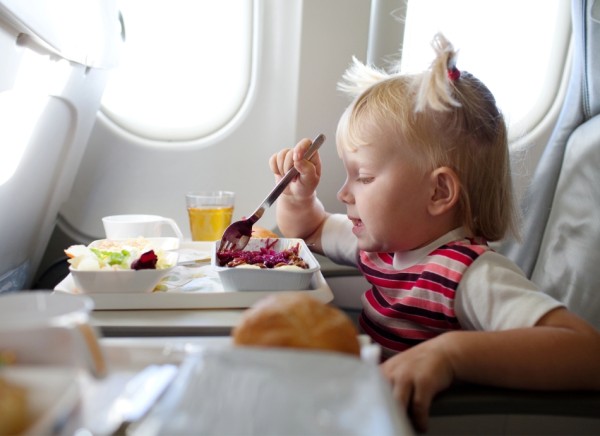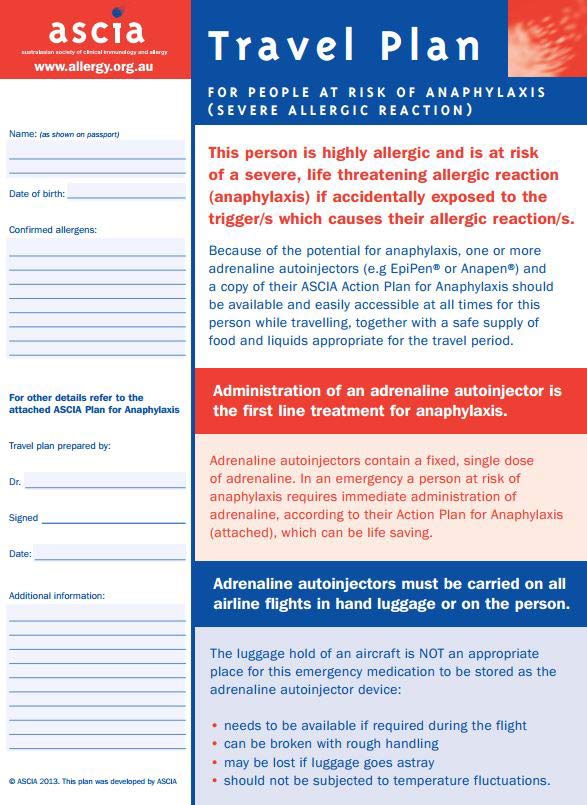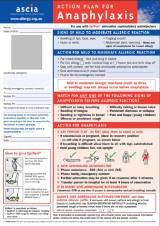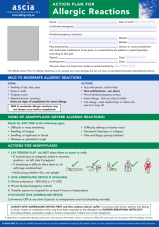You can now add Healthify as a preferred source on Google. Click here to see us when you search Google.
Food allergies and travel
How to manage food allergies when travelling
Key points about travelling with food allergies
- Travelling with a food allergy is challenging, but careful planning helps to reduce the risk of an allergic reaction.
- The information below covers everything you need to plan and consider so you can have a safe trip when travelling with food allergies.

Always get specific information and advice on travelling and your health needs from your healthcare provider.
Get your healthcare team to provide you with an up-to-date ASCIA Action Plan for Anaphylaxis(external link).
Download an ASCIA Travel Plan(external link) if you are carrying an adrenaline (epinephrine) injector. This helps if you're carrying your adrenaline autoinjectors in your hand luggage through security and customs. The travel plan is different from your usual action plans.
You can use the ASCIA Travel Checklist(external link) to help you plan your travel.
Some other things you may need from your healthcare provider include:
- prescriptions to cover your trip
- a letter about medicines you need to take
- special vaccinations
- a medical report for your travel insurance policy, if needed.
Depending on where you are travelling, you may also need vaccination against some infections. Ask your doctor or nurse about what vaccinations you need. If you have asthma, respiratory infections such as the flu can trigger an asthma attack, so ask about the flu vaccination too.
Some vaccinations may contain food allergens you are allergic to. Your healthcare team can provide advice on which vaccinations are suitable for you.
Managing food
Contact your airline to determine their food allergy policies well in advance of travel and before you book tickets.
If you have a peanut or tree nut allergy, try to choose an airline that doesn't serve complimentary peanut/nut snacks with the beverage service, or ask if a lower-risk snack can be served to you during the flight (eg, pretzels instead of packaged peanut/nut snacks). This should decrease the risk of exposure to peanuts/nuts during the flight.
Most airlines have no food restriction policies. Some food allergens can be reduced, but remember, other passengers bring their own foods onto the flight too.
Other tips
- Let passengers around you know if you or your child has a peanut or egg allergy, and to not offer them food.
- Try to position a child with food allergies away from other passengers or areas where food and drink will be passed over them, such as in a window seat or between you and a non-allergic sibling/partner.
- When you board the plane, talk to the senior cabin crew member to let them know that you (or your child) has a food allergy.

Image credit: Depositphotos
Travelling with medicines
Whether travelling by air within Aotearoa New Zealand or overseas, contact your airline to get their up-to-date policy on carrying medicines. Do your research directly with your airline and not through a travel agent.
- Most airlines recommend you carry some form of documentation or identification to support the need for your medicines.
- A letter from your prescriber and pharmacy labelled medicine is essential.
- Keep your medicine in its original packaging to reduce the risk of having problems with security and customs.
- Pack enough medicines and always keep your medicine and your emergency treatment plan with you at all times for easy access (including when you have your seatbelt on during your flight).
- Bring some spare in case you get delayed, lose it or need a higher dose.
- Check the expiry dates. Make sure your medicines haven't expired and won't expire while you're travelling.
- Adrenaline auto-injectors must not travel in the checked through luggage (as cargo) for several reasons, including:
- temperature control
- risk of damage
- the need to have your medicine close by.
Read more about travelling with medicines.
Book self-catering accommodation
Consider self-catering accommodation, which gives you option to prepare food for yourself safely. When booking, ask about and inhaled allergen risk, such as pets, if you have asthma or hay fever. If you often get sick when away from home, talk to your healthcare provider. They can increase your medicine or prescribe medicine for your travel.
Managing food at your destination
Consider bringing some of your own food to reduce your risk. Before you leave, check what food you can take into your destination country and any stop over countries. Dried or packet foods are usually easiest to manage.
Check the type of food likely to be served in the country you'll be in, and what options may be suitable for you. Find out what their food regulations are, and if food for sale (packaged or not) has to label allergens.
Follow good hygiene practice, eg, carry wet wipes with you to wipe down table surfaces, hands etc, before eating. This will help to reduce the risk of cross-contamination.
Check your travel insurance
Some travel insurance policies don’t automatically cover people at risk of anaphylaxis.
Make sure you check this and take out a policy that protects you. There is sometimes an added cost and a special approval may be required to cover anaphylaxis.
Carry translated information with you
When travelling to non-English speaking countries, carry information about your allergies, medicines you use and important emergency information translated into the required language.
If possible, bring translated chef cards(external link) to show to food service staff when you're eating out.
Hospital and other medical facilities
When you're staying in another country, make note of the emergency number and make sure you have a way of contacting emergency services, such as having a mobile phone. Know the address and directions for where you're staying to give to emergency responders if needed.
Find out the location and contact details of hospitals or other urgent medical facilities just in case they're needed.
Travelling – managing food allergy(external link) Allergy New Zealand
Translated chef cards and phrases for travelling(external link) Allergy & Anaphylaxis Australia
Webinar: Travelling overseas with food allergy – panel discussion(external link) Allergy & Anaphylaxis Australia, 2024 (includes questions and answers)
Travelling with food allergies? These 9 tips can help you stay safer in the skies(external link) The Conversation, 2025
Brochures
ASCIA Action plan for anaphylaxis(external link) Australasian Society of Clinical Immunology & Allergy, Australia, 2025
ASCIA Travel plan for people at risk of anaphylaxis(external link) Australasian Society of Clinical Immunology & Allergy, Australia, 2023
ASCIA Anaphylaxis travel checklist(external link) Australasian Society of Clinical Immunology & Allergy, Australia, 2026
References
- Travel plan and checklist for people at risk of anaphylaxis(external link) Australasian Society of Clinical Immunology and Allergy
- Travelling with food allergies(external link) Allergy New Zealand
See our page Food allergy for healthcare providers.
Brochures

ASCIA Anaphylaxis travel plan for people at risk of anaphylaxis
Australasian Society of Clinical Immunology & Allergy, Australia, 2023

ASCIA Action plan for anaphylaxis
Australasian Society of Clinical Immunology & Allergy, Australia, 2025

Action plan for allergic reactions
Australasian Society of Clinical Immunology & Allergy, Australia, 2025
Credits: Healthify editorial team. Healthify is brought to you by Health Navigator Charitable Trust.
Reviewed by: Lily Henderson, Registered Dietitian
Last reviewed:





